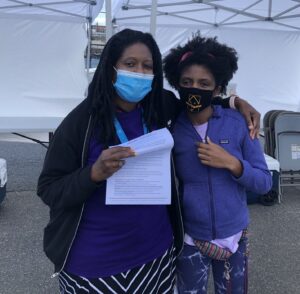 As a native Washingtonian, I grew up attending schools in DC. To my teachers and school leaders, I was deemed gifted because I did well academically and had a higher-than-average IQ score.
As a native Washingtonian, I grew up attending schools in DC. To my teachers and school leaders, I was deemed gifted because I did well academically and had a higher-than-average IQ score.
It wasn’t until my early 30s that I realized that my teachers and school leaders did not recognize my true title. I wasn’t just gifted – I was Twice-Exceptional. Not only was I a high-achieving student, but I was also an autistic student.
At the time, schools didn’t consider students with learning disabilities as students who could be high-achieving, especially if the students were autistic. Schools only considered autistic students as different and quirky. Not intelligent or deserving of academic success.
Fortunately, I defied these biases to become the strong, independent, and Twice-Exceptional woman I am today.
Yet, I can’t help but worry and hope for the same future for my daughter, Alexa.
Alexa, like me, is autistic. She also has a mental illness. Because of her dual diagnosis, Alexa has a private placement at a school in Maryland with IEP support from a public charter school here in DC.
Alexa, also like me, is Twice-Exceptional. Her math skills are beyond intelligent – I haven’t seen a student crunch numbers quite as she does. There’s also her artistic edge – the designs Alexa creates just with the flick of her Apple pen astonishes me daily.
No matter how much I celebrate and recognize my daughter’s Twice-Exceptionality, it feels as though the world never will.
Even with the Individuals with Disabilities Education Act, which mandates states to provide children with disabilities with free and appropriate public education, Alexa, and other autistic students, rarely receive equal and fair learning opportunities that neurotypical students receive.
Most students, like Alexa, will go through their elementary and secondary education without having taken accelerated courses like Algebra or participating in elective courses like Studio Arts.
While I’m thankful that our schools are focused on ensuring autistic students engage in the core curriculum as neurotypical students do, students like Alexa deserve to participate in ALL that our schools have to offer. And I’m told too many excuses for this issue.
I hear “Well, there’s not enough autistic students to create elective courses specifically for them.”
This is almost believable – especially in regards to Alexa’s identity as an autistic Black girl. Research shows that white children are more identified, tested, and diagnosed with autism than Black and Hispanic children and that autism is four times more common in boys than girls.
However, I can’t help but think about the one-fourth of children – most of them Black and Hispanic – that go undiagnosed. Even if they are never to receive a formal diagnosis, could we at least support these students by providing them the same educational opportunities that they would have received otherwise?
I also hear “Well, money has to be saved for our autistic students entering college.”
This viewpoint is an ableist and classist trope. Many colleges and universities are not accepting of autistic students – they do not provide a space that supports their additional learning needs. Furthermore, not every autistic student may have the financial means OR even the interest to attend college. Above it all, if we refuse to invest in the current educational needs of our autistic students, we classify them AND their post-grad plans and dreams as “less than.”
Finally, I hear “Well, DC does not have access to the funding to provide resources and supports for these students that states like Maryland and Virginia have.”
And to that I say, let’s make DC a state so it can receive these resources and supports.
Every day it feels like I ask myself hard questions regarding Alexa’s future. Should I keep her in high school even after she turns 18? Will and can Alexa participate in a summer youth employment program that supports her development? Will Alexa need additional supports from her school that will cost my family more than we can afford?
So those are the hard questions and they come with hard answers.
But then there are the questions like What are Alexa’s possibilities? What are Alexa’s opportunities? Where is Alexa going to go next?
These questions, while not always easy to answer, are a lot more fun to think about. Because despite the barriers in her education, Alexa hasn’t given up and neither will I. She has a bright future ahead of her and we’re both determined to continue fighting and see what it is.
By Renee Davis, Ward 1 PLE Board member

